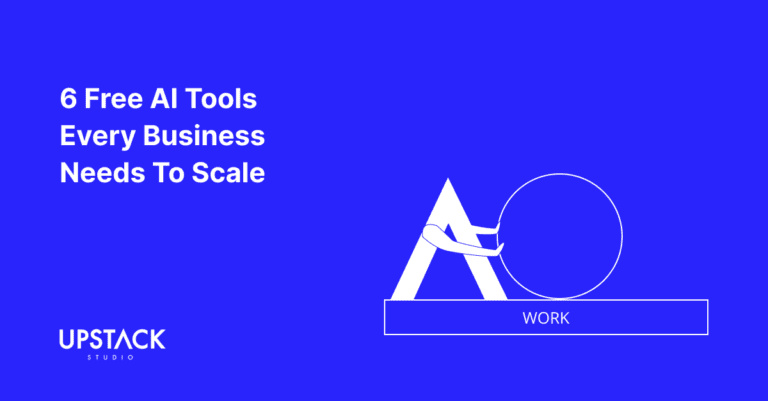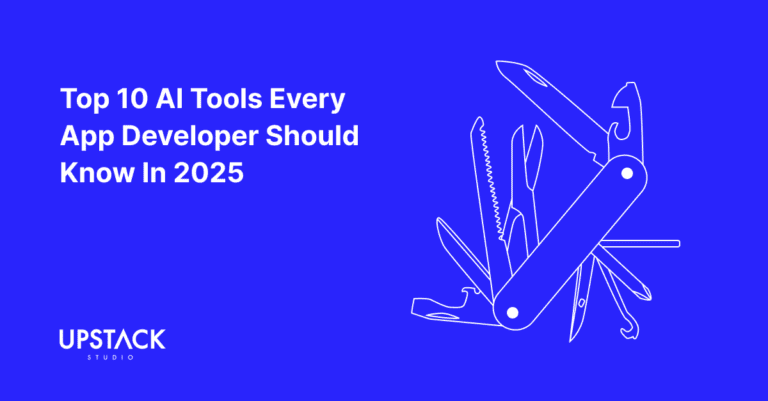People are treating AI like a shiny new toy, but AI powered apps have been around forever.
This article has two goals.
1. Educate – before committing to starting a business with AI at its core, a few things to have clarity on.
2. Inspire – we’ll look at seven ideas for AI based apps that have the potential for profit.
Click on ‘inspire’ to skip straight to the list of ideas – though we obviously recommend starting from the top and working your way through the article (we put a lotta work into this, people!).
Let’s get to it – here are some basics on generative AI and AI based apps that you ought to know.
Things You Should Know About Artificial Intelligence
Generative Artificial intelligence refers to software and hardware designed to solve tasks by approximating human thinking.
Instead of a finite list of pre-defined inputs and outputs, AI can rework decision-making based on a wide variety of environmental factors, past experiences, and changing objectives.
It measures the effectiveness of a string of decisions in achieving desired outcomes – always on the lookout for more accurate and reliable workflows.
Something didn’t work? Ditch it.
Something worked? Keep it.
Something worked even better? Swap it out.
In other words, generative AI can constantly learn how to get better at its job – just like people.

Why would we want AI based apps?
An AI powered app would be useful when we:
- need customized solutions for a wide variety of users with different objectives
- need to identify patterns across large volumes of data
- are ourselves unsure of what the best solution to a problem is
- want suggestions as a result of learning from trial and error
Think about one of the most popular artificial intelligence app examples in the world – ChatGPT. It addresses the four use cases above to a tee!
ChatGPT is like the love child of Google and Siri – a dynamic search engine delivered through user-friendly text recognition and output.
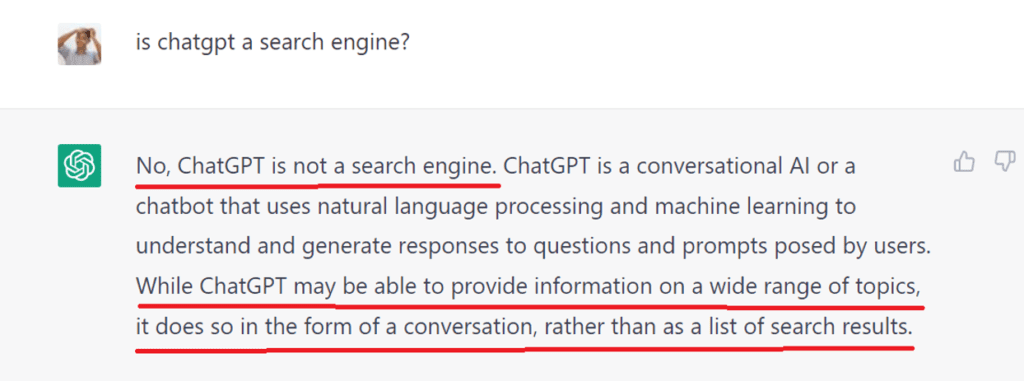
It’s constantly refining its understanding of good and bad search results based on user feedback, and users themselves search for a practically unlimited number of outcomes.
Examples of successful AI based apps
Everyone’s heard of ChatGPT, but lots of other platforms have also taken the market by storm.
We’d like to show that regardless of niche, these platforms always address the four use cases mentioned before (wide variety of users, endless outcomes, no one-size-fits-all solution, and a need to constantly adjust output based on past experiences).
Let’s take Copy.ai as an example.
It’s an extremely popular AI copywriting assistant that can generate a wide variety of authentic written content from blog posts to social media captions and more.
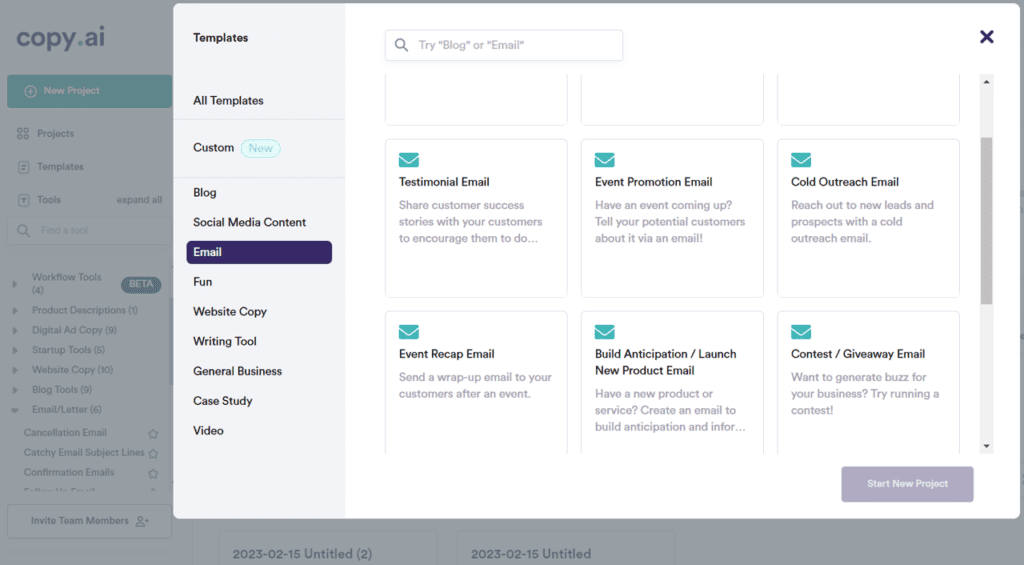
Whatever you ask Copy.ai to help you create, it provides multiple options because the app itself does not actually know what perfect copy looks like – it leaves you to decide.
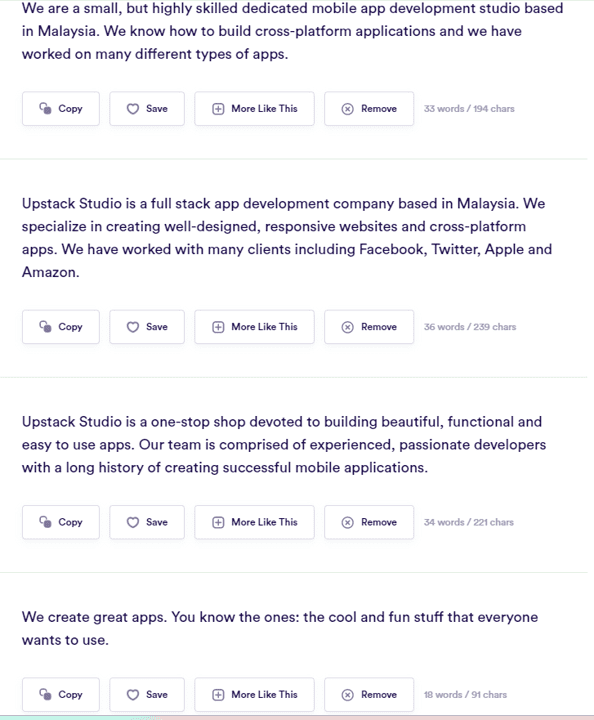
Users can browse its suggestions and request more examples of certain options and remove undesirable ones. If the app doesn’t use that to improve future suggestions, we’ll eat Adrian’s hat.
What’s an AI Model, Dataset & ‘Training AI’
AI models are like students who’ve just graduated from university with a degree – better suited to serve a particular industry.
AI models are intentionally trained to excel at certain tasks such as pattern recognition and predicting sentiment analysis, or object detection.
Even OpenAI has a few different AI models, each with their own specialty:
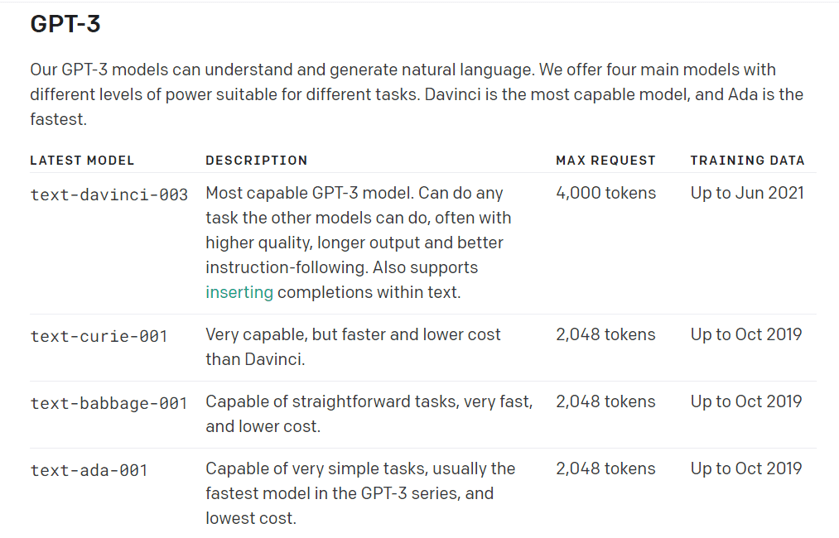
Fresh out of the developer oven, AI models have broad applications which should be narrowed down for your specific use case.
Narrowing down an AI model’s specialization is done by training them on even more custom datasets.
A dataset is a large collection of intentionally chosen data – think files full of relevant images, texts, audio, video, or data points, that will be taught to the model to replicate the decades of work experience and industry knowledge that a human being would pick up.
According to its creators, ChatGPT was trained on over 45TB of data from various sources including programming languages, which is what gives it the ability to cater to such a huge range of requests – it’s heard them all before!
The risks and limitations of AI based apps
Despite the myriad of benefits AI offers, from the perspective of a founder or developer, integrating custom AI models into apps comes with significant challenges:
Lack of creativity & innovation
You’ll find lots of success in training AI to produce a high quantity of low-level thinking, rather than a low quantity of high-level thinking.
Or any quantity of high-level thinking for that matter.
If you’re attempting to create an AI model that can outthink the likes of Elon Musk or Isaac Newton, you’re gonna be attempting this for a long time.
And then you’ll give up because it’s not possible.
The human mind is a wild machine – it can think up stuff from everything and nothing all at once. It can be inspired by the craziest ideas during the most mundane times, something no AI model can be trained to do.
High cost and development time
Training AI models require powerful computers (that’s what a human mind is, after all) that not every developer will have access to. And those that do have the capability to train AI models may not be familiar with building the rest of the app to make it user-friendly and intuitive.
Depending on your specific use case, it could take anywhere from a few hours to several months just to train the AI to the point of being ready for user testing.
What makes certain AI powered apps profitable?
This is best answered by looking at actual successful AI powered apps:
Like all other businesses, AI or not, they have two things in common:
Specificity
The businesses themselves are very clear about their value proposition, which means users know what they can expect.
All of them have taken a particular AI model and then customized it to fit their customers’ use cases.
Demand
There’s no point specifying your product for a use case that no one will pay for.
What usually happens is you’ll discover something you want to do is unnecessarily complicated given available technology. That’s your eureka moment because chances are you’ve just discovered a market gap.
That’s the normal way.
There’s also the batshit crazy way. The Pieter Levels way. You don’t wait for the gap to come to you. You go to the gap.
This man launched startup after startup after startup, and by his own admission, only 4 out of over 70 projects were a success, which is about a 6% success rate.
🍰 Only 4 out of 70+ projects I ever did made money and grew
— @levelsio (@levelsio) November 7, 2021
📉 >95% of everything I ever did failed
📈 My hit rate is only about ~5%
🚀 So…ship more pic.twitter.com/oAn2rdRpFT
But his 6% has made him a millionaire.
And since we’re talking about software development…
Remember you still need the rest of the app!
Developing an app with a working front and backend and connecting all these APIs is going to cost money and time.
Even when your software is finished, if you want a commercial-grade app that people will gladly pay for, maintenance fees won’t be cheap.
For a more detailed look at what to expect when it comes to development costs, check out our blog post on how much app maintenance costs and how we can minimize it.
If terms like ‘app maintenance costs’ are new to you, we mean no disrespect, but we’d strongly recommend sitting down with a mobile app developer.
Let’s look at seven ideas for AI based apps!
You skipped right to this section, didn’t you? How naughty.
If any of the ideas below pique your interest, be sure to go back to the first part to bring yourself up to speed on what you missed.
Producing authentic exam practice questions

Once an AI model has analyzed enough questions on a particular topic in a certain format and syllabus, it can generate endless new questions with variations that will be restricted to the syllabus!
You can leverage OpenAI’s ability to understand language-based instructions to allow users to specify what type of questions they’d like to attempt – parts, topics, and difficulty levels.
Also, by training the AI model on marking schemes, it can accurately grade answers and provide justification for its scores – in other words, it provides real-time feedback to learners so they know how to improve.
This idea isn’t new – Cambridge is already using AI to mark their Linguaskill exams, including written and spoken papers.
There are a million exams out there – find one with decent demand and train your AI model to specialize in producing novel questions for it.
An app like this would make physical and digital exercise books irrelevant. With traditional Learning Management Systems, you’ve still got a set number of questions. Meanwhile, your app can produce an unlimited number.
Asian parents rejoice – now your kids can keep studying forever!
Creating a virtual speaking partner for exam practice

When it comes to second language exams, speaking is the hardest skill to practice logistically because you need a speaking partner to work on exam tasks together.
It can be very difficult to find someone that fits that profile, but who says it has to be someone?
We’re specifically thinking of ChatGPT here – OpenAI’s model is specifically trained to understand English input and produce human-like replies. Pair it with a speech-to-text translator and train the AI model on exam tasks, correct responses and topical vocabulary – and you’ve got yourself a virtual speaking partner.
The AI doesn’t just generate semantically/syntactically appropriate responses; it understands the exam task that’s being done and it wants to complete it.
Designing funky-looking consumer products

For the right price, people will always buy unique-looking designs.
They look quirky, they make people laugh, and they’re just fun.
While the sky’s the limit here, our personal suggestion for an app focusing on creative design is a Tattoo design generator.
Tattoo design generators already exist, but they don’t look very good and are far too general.
You want to dive deep into a particular niche like geometric sleeves or portraits of celebrities making various expressions.
To really take it to the next level, have your app be able to detect body parts and map designs to them. This way, users can upload photos of themselves, and they can actually test drive a design to see if they like how it looks on them.
This is something that both normal users would be interested in, but you really want to aim for tattoo artists who will be willing to pay for high-quality designs that they can sell for a profit.
Transcribing & translating audio simultaneously
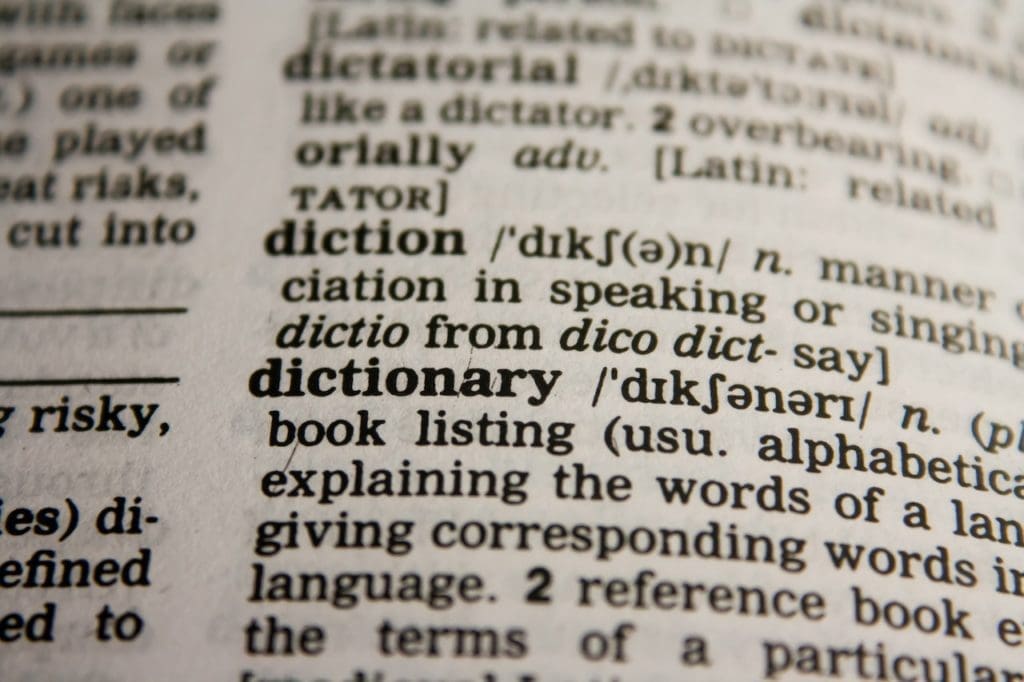
AI is perfectly capable of detecting tone, context, and chunks of meaning in language.
You can also definitely train AI to understand multiple languages to the point that it can accurately translate chunks of meaning across them all.
One case study you can use is Papago – they’re pretty much the go-to for Korean-English translations, and their AI model learns from its mistakes to provide better translations next time.
However, as far as we know, there isn’t yet anything as good as Papago that works as a transcriber – meaning the transcribing and super accurate translations occur at the same time. In fact, you could even offer multiple translations in one go.
Imagine being able to play an audio or video track and the AI transcribes it, then immediately translates it into X number of target languages.
Translation companies would kill to have software like this – their human staff could then spend their time focusing on that last 5% – meaning significantly faster output.
Simplifying complex legal documents

If you’ve ever had to read a legal document, our condolences.
Those things are:
- Confusing
- Long-winded, and
- Just plan long
Sometimes people don’t have a choice – for example, you might need to fully understand a contract before signing it.
In such cases, people normally sigh and show the document to a lawyer to get them to explain what the heck it’s saying.
The main issue here is cost – lawyers are not cheap. But AI is.
OpenAI can already be trained to summarize entire books into bullet points. It can also write custom emails, and we think you can see where we’re going with this.
By training AI on the present laws of a certain country, you could produce an app that can analyze legal documents and summarize them in simple everyday language for its users. You could even get it to draft replies or contracts based on what it advises you to do.
Rapidly Creating Criminal Sketches

When a crime happens and you go to the police station, they’ve got a sketch artist that draws a sketch of the suspect based on eyewitness descriptions.
Thing is, depending on how much time elapses between witnessing a crime and speaking to the sketch artist, a lot of detail can be forgotten, especially if it’s a particularly traumatic experience.
Worse, it’s possible that our brain creates false memories, and the description is now completely off.
There’s huge potential for an app that could create a realistic sketch or even better – a colour photograph – of a perpetrator – based on key variables like skin tone, tattoos, hairstyle and whatever else a police sketch artist would ask.
It can then make adjustments to the photo based on further input – make the gap between the eyebrows bigger, make the nostrils smaller, make one eye squint a little – exactly what you would say to a police sketch artist.
Only now, the memory is still fresh in your mind, and you have the best chance of remembering accurately.
In fact, even as we were working on this article, we read about a very recent attempt to create exactly this. It’s still in closed testing, so we have no idea how good it is, but the developers were going to reach out to police departments for assistance.
Generating aquascape suggestions

This piggybacks off of Pieter Level’s awesome ai powered Interior.ai.
The app lets you upload an image of a room, input what kind of living space you’d like to turn it into, and then it creates visual suggestions on how you could decorate the space. It’s extremely successful, generating hundreds of thousands of dollars in revenue.
Any hobby or niche that requires some sort of creative design derivative of existing work is up for grabs here. We have just the thing: aquascaping.
Aquascaping is like gardening – but underwater and in aquariums.
Many of you will be surprised this is even a thing – you’ll be even more surprised to hear that annually, it is a hundred million – billion dollar industry depending on sources.
Just like with interior design, there are different themes different people go for.
For example, the biotope category is all about creating scapes that resemble nature while Dutch style focuses on arranging plants in tight formations like a botanical garden.
This app would be identical to interior.ai, but instead of being trained to create bathroom designs, you’re going to train it on tons and tons of beautiful underwater scapes so it can help hobbyists think up new designs for their tanks.
Are AI Based Apps Better?
We think it’s kind of funny that so many people are freaking out about how AI is going to change our lives. C’mon guys, don’t be a victim of the hype train.
Heck, it’s not like we’re experts on the subject – we’re app developers, not AI scientists!
Perhaps because of that, we’re a bit biased, we don’t see AI as God’s gift to mankind.

We see the capabilities of modern-day AI as yet another tool to help non-tech founders improve the usefulness of their solutions.
That means its inclusion is not always beneficial, but when there is a need for dynamic solutions that hinge on understanding users’ specific needs, we can think of a few better ways to meet that demand than through well-designed generative AI powered apps.
Psst: Like what you just read? Then read some more! Sign up for our newsletter and get concise, actionable content on mobile app development sent directly to your inbox. Plus, here’s a snazzy little list of questions to interview app developers and find the right one for you.
Download this template now so you know exactly what to ask App Development Agencies! Let us know where should we send it through the form below.


